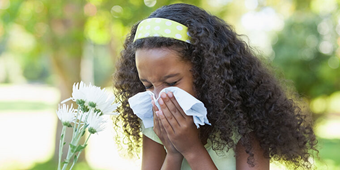Avoid Common Summertime Woes. Here’s How.

Answer a few questions and we'll provide you with a list of primary care providers that best fit your needs.
Summertime outings shouldn’t end with a trip to Urgent Care. Family nurse practitioner at Premier Health Urgent Care in Springboro, Brittany Jamison, MSN, APRN, FNP-C tells Premier Health Now what ailments she sees most and how to avoid them.
Rashes
Rashes from poison ivy, oak, or sumac are the complaints Jamison sees most often. To prevent a rash, she suggests a vigorous scrubbing of any skin which may have been exposed in order to remove the toxic oil emitted from the plants. Grease-cutting dish soap can be especially effective.
Such rashes can’t be spread from person to person, according to the U.S Food & Drug Administration. But it’s possible to catch it from plant oil that’s stuck to clothing, pets, or garden tools. This two-minute video from the FDA shows how to recognize the poisonous plants so you can avoid them next time.
“At Urgent Care we’ll likely treat the rash with a steroid: cream, oral medication, or injection. Rashes due to poisonous vines can last several weeks, but we can help improve symptoms with appropriate treatment. We will also discuss and educate regarding appropriate over-the-counter medications and supportive measures for additional relief,” Jamison predicts.
Insect Bites And Stings
Bites and stings are another common reason for trips to Urgent Care. “We see patients who either have a lot of bites, or who are very swollen, itchy, and red,” says Jamison.
Like rashes, bites and stings typically are treated with steroid cream or an injection, says Jamison. “If it looks like an infected bite, we might also provide an antibiotic. And if you’re among those allergic to bee stings and have an anaphylactic reaction, we’ll stabilize you and safely get you to the Emergency Department.”
- Keep food and drinks covered.
- Wear repellant with DEET.
- Wear bug repellant bracelets. “My family wears them on our wrists and ankles,” says Jamison.
- Avoid going barefoot in the grass to prevent bee stings, especially on July 10, which is Don’t Step On a Bee Day! This specially-named day calls attention to the importance of bees (they pollinate more than a third of the world’s crops) and what you can do to preserve them.
Ticks
“We see a lot of tick-related conditions including bites, embedded ticks, and rashes at Urgent Care,” says Jamison. It’s important they be removed quickly and completely, she adds. “We have special tools to accomplish that if you’re not successful on your own.” Deer ticks are especially troublesome as they can cause Lyme disease. “We look for a rash that resembles a bullseye, which can indicate possible Lyme disease.” If caught early, it’s easily treatable with antibiotics. A blood sample may also be taken to confirm the diagnosis.
Avoid ticks by wearing repellant with DEET, tucking pants into your socks, and wearing light-colored protective clothing, especially in wooded areas and high grass. Walk in the center of trails when hiking. Once home, check your clothes and body for ticks (check the dog too!).
Sunburn
“We see our share of sunburn,” says Jamison. “Unfortunately, there’s not a lot we can do other than educate the patient on how to avoid it next time,” she adds. If we see excessive blisters or suspect sun poisoning, we can recommend a good list of supportive measures including cool compresses, over-the-counter NSAID therapy (such as ibuprofen), and soothing aloe, topical lotions, creams, and gels. “If patients are experiencing nausea related to excessive sun exposure, we can offer prescription medications to reduce symptoms.”
How to avoid it? You know the drill:
- Coat yourself from head to toe with SPF 50 or more sunscreen, Jamison recommends. “I spray my kids with sweat-resistant sunscreen on top of that. Be sure your sunscreen hasn’t expired, follow the package instructions for reapplying, and apply it while you’re still indoors and have plenty of privacy,” she adds.
- Wear a wide brim hat. The face is especially sensitive.
- Use an umbrella for shade.
- Avoid the sun during peak hours: 10 a.m. to 2 p.m.
Fireworks
Fireworks are fun but dangerous. Each July 4th holiday results in serious burns, loss of fingers, and even blindness, reports the National Council of Fireworks Safety. “At Urgent Care we can treat minor burns or abrasions due to fireworks. But serious, life-threatening injuries should go directly to the Emergency Department,” says Jamison. Avoid injuries by leaving fireworks to the professionals.
Answer a few questions and we'll provide you with a list of primary care providers that best fit your needs.
Source: Brittany Jamison MSN, APRN, FNP-C, Premier Health Urgent Care; U.S. Food & Drug Administration; Business Insider





